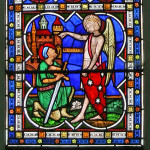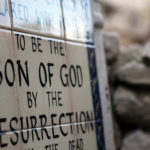We run our website the way we wished the whole internet worked: we provide high quality original content with no ads. We are funded solely by your direct support. Please consider supporting this project.

Religion that Blinds Us to God
For a variety of reasons, many Jews at the time of Jesus had come to believe that heaven had been closed since the writing of the last book of the Old Testament. God was distant and no longer active among his people. Their religion focused on holding fast to the law God had given in the past and various religious interpretations and traditions that had been developed from that law. While God had originally given the law as a means of fostering a living relationship with him, these people had made the law an end in and of itself. Rather than getting their life and worth from the God who gave the law, they were attempting to get life from the law itself.
In other words, religion had become a substitute for the living God.
This is one of the reasons these Jews couldn’t see that God was present in Jesus Christ. All they could see was a man who didn’t follow the religious rules. For example, Jesus offended them by healing and feeding people on the Sabbath and by hanging out with people with scandalously sinful lifestyles. They couldn’t see the beautiful way this revealed a God who cares more about people than rules. Because they were trying to get life from their religious tradition, they missed the beauty of what God was doing right in front of them.
In an attempt to help these misguided people get freed from their religious blindness, Jesus once responded to their criticism of his healing a man on the Sabbath by saying, “My Father is always at his work to this very day, and I, too, am working” (Jn 5:17). God hadn’t stopped being active, Jesus was saying. He’s always been about his work, and never more so than in the miracle Jesus had just performed.
It wasn’t that God had stopped talking and working. These people had simply stopped listening and looking.
If we are not careful, our own religion can blind us to the ever-present God. Instead of relying on the living God to give us the worth and significance we crave, we can easily start relying on religious traditions, doctrines, and ethical rules in order to get life. We feel like our life is worthwhile and significant because we are right—as opposed to all those who are wrong. The more tightly we cling to our religion, the more our judgments will blind us to the living God who is always active right under our noses.
Instead of rejoicing that God has just healed a man, we might find ourselves offended that one of our religious rules was broken.
Traditions, doctrines, and ethics are important. But they help us participate in the life God has for us only to the extent that they facilitate a loving relationship with God, ourselves, and others.
The Father is always doing his work, which means the time to look for the Father working is now. The place to look for the Father working is here. And the people in whom we must look for the Father to be working are ourselves and whoever we happen to encounter.
—Adapted from Present Perfect, 132-134
Photo credit: Oscar Keys via Unsplash
Category: General
Tags: Jesus, Relationships, Religion, Religious Idolatry
Related Reading

Overview of Crucifixion of the Warrior God
Greg reviewed the content of his new book, Crucifixion of the Warrior God, as a part of the Woodland Hills Church Covenant Partner gathering on March 5, 2017. If you want a fairly succinct synopsis of the thesis of his book, look no further. Ten years ago, Greg set out to write a book justifying the…

A Dialogue with Derek Flood Part 2: Is ALL of the Bible Inspired?
Image by TheRevSteve via Flickr Yesterday, I offered the first part of my response to Flood’s comments regarding my review of his book. Today I’ll finish up my thoughts. Scripture and Its Interpretation Flood confesses that he is confused as to how I can claim that “in the light of Christ, we must reject violent interpretations of Scripture”…

Jesus, the New Israel
The Gospels present Jesus and the Kingdom he inaugurated as the fulfillment of Israel’s story. For example, Jesus’ birth fulfills Israel’s longing for a Messiah; his return from Egypt as a child mirrors their Exodus out of Egypt; his temptations in the desert allude to Israel’s temptations in the desert; his twelve disciples recall the…

Do the Gospels Promote Anti-Semitism?
Over the last couple of weeks we have been looking at various passages from the Gospels that have been used by some to argue that Jesus condones violence. Here is a link to each of them: The Cleansing of the Temple and Non-Violence Was Jesus Unloving Toward the Pharisees? Violent Parables? Why Did Jesus Curse…

Why Does God’s Activity Seem So Arbitrary?
Why? It’s the question that never goes away. Why is one infant born sickly and deformed when at the same time another is born perfectly healthy? Why does tragedy repeatedly strike one family while another seems to enjoy uninterrupted peace? On and on we could go with examples. It all seems so arbitrary and unfair.…

The Jesus Seminar and the Reliability of the Gospels
The Jesus Seminar The primary driving force behind the popular media’s present preoccupation with liberal views of Jesus has been the Jesus Seminar. This Seminar, first convened in 1985 by Robert Funk, is a gathering of 100 or so mostly liberal New Testament scholars who meet on a regular basis. They have determined, by a…
